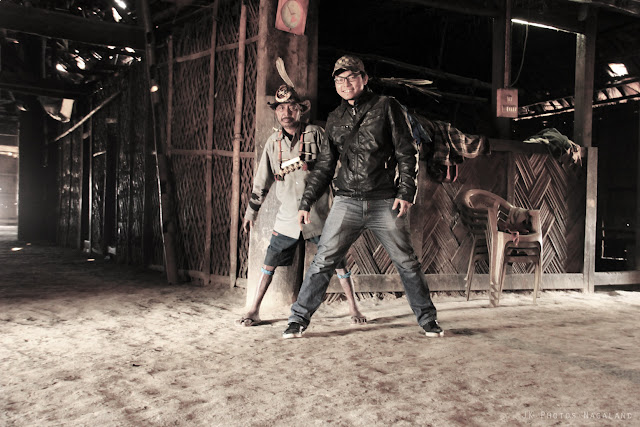Ever heard of an international border that passes through a house? I bet not. Well, there is one, at least that I heard of, in Longwa village in Mon district of Nagaland.
The international border between Indian and Myanmar apparently runs through the village chief’s house. They call the chief “Angh” in the local dialect.
Mon district of Nagaland is mostly inhabited by the Konyak Naga
tribe known to be fierce head hunters back in the days before arrival of
Christianity. The Konyaks are also found in Myanmar, in the Tirap and
Changlang districts of Arunachal, and in the Mon district of Nagaland,
India. They are known in Arunachal as Wancho Konyak.
Longwa Village is about 40 KMs from the Mon district headquarter, and is reachable via Assam’s Sonari town. The road to Longwa is decently motor-able from Mon town. The view of hills and fields along the way would have been worth much more if traveled on motor cycle I thought as we sped past curvy roads on a gypsy (even on a good road we fell bumpy on this all condition vehicle :p).
Longwa Village is about 40 KMs from the Mon district headquarter, and is reachable via Assam’s Sonari town. The road to Longwa is decently motor-able from Mon town. The view of hills and fields along the way would have been worth much more if traveled on motor cycle I thought as we sped past curvy roads on a gypsy (even on a good road we fell bumpy on this all condition vehicle :p).
Finally, after about 2 hours of winding road around various hills, a post by the Border Road Organisation welcome us to Longwa.
 |
| Welcome to Longwa |
Longwa Village from a distance
From this distance, the structure that is prominently seen is a church building in the middle of the village. Nagas turned head-hunters to Christians and in almost every village, the church building is usually the biggest structure one would see.
The Angh of Longwa and his famous house
Almost every Konyak Village is headed by a chief, known as "Angh" without the exception of Longwa Village. But this Angh might be different from the other Anghs, and possibly the only one with an International border right in the middle of a house! We had only heard or seen about it on documentary videos before, and I recall we were fascinated by it even then. We were excited to see it for real this time.
The Angh of Longwa, wearing a hat and the iconic brass skull necklace worn by Konyaks, cheerfully interacted with us in the common “Nagamese” Creole and showed around his house; and of course, the international border that passes through his house. The surprising thing was that there was so sign of any physical boundary even outside his house.
As he stood on the Burma side and we on the Indian side he gleefully said -
 |
| Update (2016): Heard he is no more. He was succeeded by his son. |
 |
| The house of the Angh of Longwa Village, Mon, Nagaland |
 |
| The India - Burma (Myanmar) International border is apparently between our feet. |
“Ami tu, Burma pha-ne. Apuni khan tu, India." ( I am in Burma side, you guys are in India")
See items on display inside the house of the Angh.
The Border at Longwa Village, Mon, Nagaland
From the “Zero Point” at a dead end road, we can see hills in the Burmese territory on one side and the Longwa Village on the other. The border is surprisingly not manned heavily and there is not a sign of heavy fences between India and Myanmar (Burma) there. People easily commute across the border. In fact, there are Konyak settlers on the Burmese side as well. The only hardly significant military presence was a small, 33rd Assam Rifles camp with a helipad nearby manning the border from the Indian side.
Dead End Road - Zero Point at Longwa
Konyak settlers on the Burmese side
Places like Mon in Nagaland could be an an off-beat trip even for most Nagas in towns and cities. The environment is totally different and remote. Food could be a problem for outsiders when visiting interior villages especially for vegetarians. For the vegetarians, just like Mayur in the show “Highway on a plate” in Kohima (video link) advises vegetarian tourists, “When in Nagaland, bring chips wherever you go“
See more:
Items on display inside the house of the Angh.
Konyak artifact items on sale











Comments
Post a Comment